Damaged skin barrier? We speak to the experts to discover why it’s important, what products damage it and how to repair skin barrier function for good
JUMP TO SECTION
Click the links below to jump to the relevant section:
What are the three skin barriers?
When shopping for skincare you may have heard claims about certain products being able to protect, maintain or even repair your skin barrier.
The term skin barrier refers to the outermost layer of the three layers that make up the skin.
It effectively works like a shield against the outside world, and it’s what determines how your skin looks and feels.
Damaging it can lead to wrinkles, breakouts and rashes.
While maintaining your skin barrier can help you look younger for longer and give you a healthy glow.
Yet what exactly does the skin barrier do, what are the signs of a damaged skin barrier and how can you repair skin barrier function for good?
Let us explain.
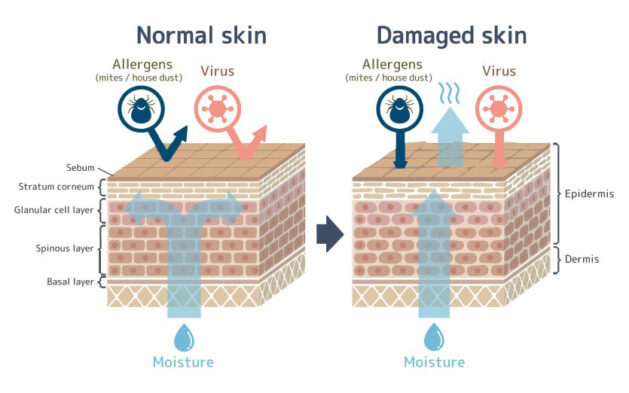 Shutterstock/mamabella
Shutterstock/mamabella
“The skin is a remarkable organ,” Robin Parker, Director of THG Labs told mamabella. “Its primary purpose is to protect the entire body from detrimental external factors. On a micro level, one of the most important functions of the skin is to control water loss and keeping the barrier properties in perfect balance is critical for healthy-looking skin.”
THG Labs is a UK-based development and manufacturing firm that partners with beauty brands to create innovative products.
Your skin barrier protects you from environmental threats such as pollution, as well as so-called free radicals. Free radicals are unstable atoms that can damage cells and lead to ageing and skin conditions. You can read more about free radicals here.
Your skin barrier is able to do this because it’s slightly acidic. This acidity helps to create a buffer against the growth of harmful bacteria, viruses and fungi that can each damage your skin.
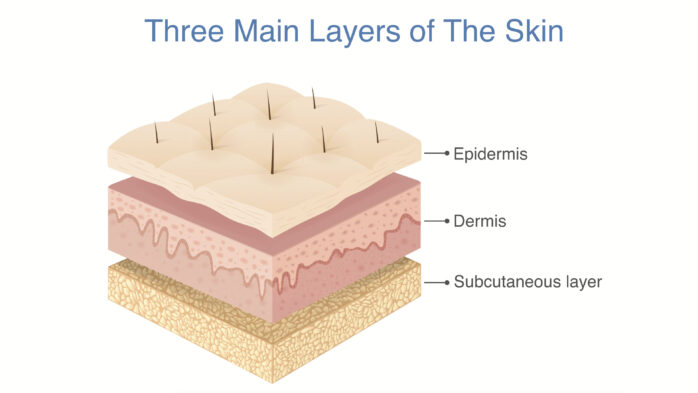 Shutterstock
Shutterstock Each of us has three layers of skin and they each play a part in protecting your body. These include:
These layers are often referred to as barriers but it’s the epidermis that’s officially the skin’s barrier or shield from the elements. It’s this layer that skin barrier products work to repair and maintain.
This outer layer is made up of corneocytes (skin cells) that are bound together by lipids. If you imagine this layer of skin like a brick wall, your corneocytes are the bricks and the lipids are the mortar holding the bricks together.
Within this brick wall, you’ll find keratin, natural moisturisers, cholesterol, fatty acids and ceramides. Unfortunately, the shield protecting your face is a lot thinner than a brick wall and needs all the help it can get to function well and be maintained. The good news is there is lots you can do to protect your skin barrier, especially if you know how it can be damaged and how to help protect it.
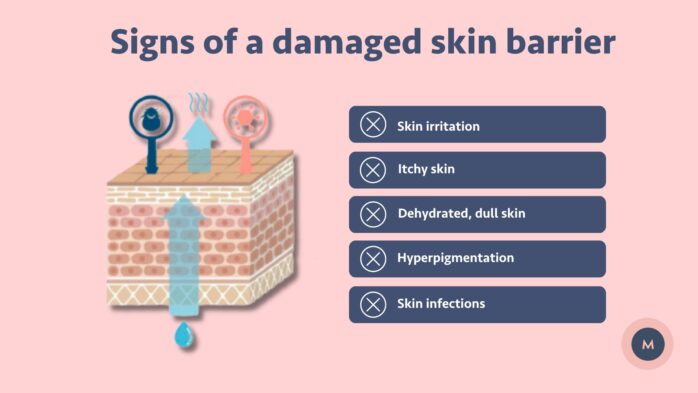 Shutterstock/mamabella
Shutterstock/mamabella If your skin barrier is damaged your skin can feel rough or dry, be flaky, sensitive, irritated, itchy and may look dull.
When the skin barrier is damaged, it’s not able to hold onto the vital substances, like the ceramides, cholesterol and fatty acids that keep your skin cells intact.
You’ll then have water loss and your skin is much more vulnerable to free radicals that can do further damage.
Signs of a damaged skin barrier include:
Rosacea and eczema can also be a sign that you have a damaged skin barrier. These conditions are largely genetic but stem from the skin barrier not working as it should. This is why using products or doing things that damage the skin barrier generally can make rosacea and eczema worse.
FURTHER READING: What is eczema and can you ever get rid of it? | 7 of the best rosacea creams and treatments
Most skin barrier damage comes from stripping your skin of its natural oils.
Your skin’s natural oil, or sebum, consists of waxy and oily substances on the surface of your skin. Sebum is made up of fatty acids, squalene (a colourless poly-saturated hydrocarbon liquid) and other lipids.
The sebum keeps your skin moisturised and forms a protective barrier against bacteria and other harmful elements, so if it’s damaged it can lead to dry, sensitive and irritated skin. This is caused by:
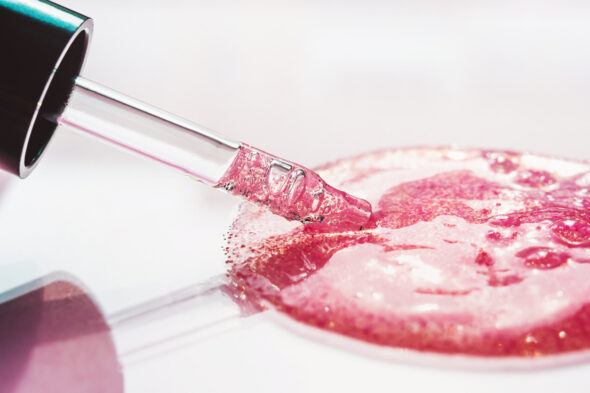 Getty Images/iStockphoto
Getty Images/iStockphoto
BOOST CERAMIDES
To maintain ceramide production, try to eat foods high in sphingolipids. This includes eggs, soy, wheat and dairy products.
You’ll also want a skincare product packed with synthetic ceramides like CeraVe’s moisturising cream.
All CeraVe products are good for your skin barrier because they include ceramides 1, 3 and 6-ll. These ceramides maintain your skin barrier and lock in moisture.
The older you get the weaker your skin barrier can become. Ceramides (produced naturally in your body) form approximately 50% of your skin barrier, but as you age there’s a dramatic decrease in ceramide levels.
This means your skin loses its ability to hold onto moisture and becomes compromised.
Ceramides are naturally occurring waxy lipid molecules found in between skin cells.
They link your cells together and form a protective, waterproof barrier. With your ceramide level dropping, gaps between your skin cells can form, which allows for bacteria and irritants to enter.
You can read more in our guide: What do ceramides do and how do they help the skin?
Air pollution can create oxidative damage to the skin, which is where the number of oxidants exceeds the antioxidant defence system capacity (also referred to as oxidative stress).
This can break down collagen, leading to the disorganisation of collagen fibres in your skin, which then causes fine lines, wrinkles and dark spots.
Another form of oxidative damage comes from the sun’s UV rays (ultraviolet radiation).
They cause a dramatic increase in the production of reactive oxygen species (ROS) and this sudden increase shifts the natural balance of your skin toward a pro-oxidative state and results in oxidative stress.
FURTHER READING: The best CeraVe products for all your skincare concerns – from acne, wrinkles, bumpy skin and eczema
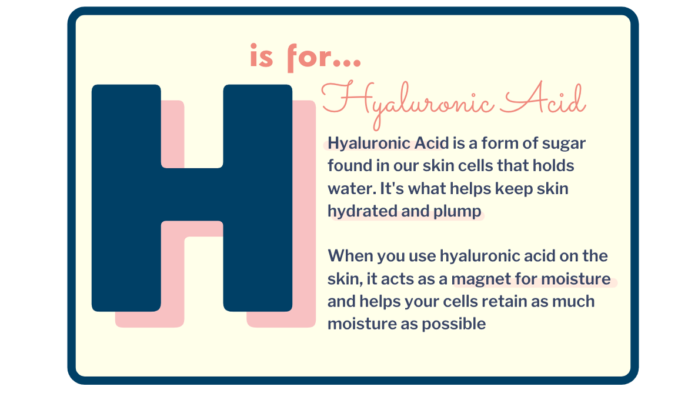 mamabella | mamabella
mamabella | mamabella The good news is it is possible to repair skin barrier problems. It can take a couple of weeks, due to your skin’s renewal cycle, but it is doable.
When looking to repair your skin barrier, you’ll want to look for products or foods that contain the following ingredients:
There are certain plant oils that can help repair your skin barrier, too. Many of these have antibacterial, anti-inflammatory and antioxidant effects. Such oils to look out for include
You should then avoid or limit the use of:
If you like or need, to use these products we suggest using them in the evening when your skin then won’t be immediately faced with the outside world and environmental aggressors that can irritate your skin.
Expert Facialist Tine Hagelquist recommends using the Perricone MD High Potency Classics Hyaluronic Intensive Moisturiser because it “contains three different forms of hyaluronic acid to deeply moisturise and nourish.”
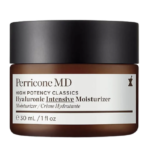 Perricone MD
Perricone MD It also contains DMAE and rosemary leaf extract to lift and tighten the appearance of the skin over time, all while helping to address dehydration and improve skin barrier function.
You’ll also want to pick a product that has a similar pH level to your skin. Your skin’s delicate acid mantel – part of your skin barrier that helps keep moisture in and the bad stuff out – is usually between a pH of 4 and 6, whereas skincare products can range from a pH of 3.7 to 8.2.
We like to start the day with the low-pH Good Morning cleanser from COSRX, which is mildly acidic and has a pH level that’s similar to skin.
If you have oily skin this cleanser is especially good for you because it includes tea tree oil which helps regulate your production of sebum. By rebalancing and restoring your skin’s optimal pH level you’ll be helping to protect it from external aggressors.
Director of THG Labs Robin Parker recommends using ESPA Optimal Skin Pro-Moisturiser: “ESPA moisturisers and supporting formulas help skin barrier repair due to their high use of nourishing natural vegetable oils.
“The Optimal Skin Pro-Moisturisers combine a combination of natural oils to deeply nourish the stratum cornea (top layer of your skin) and help build an effective skin barrier.”
This particular moisturiser contains jojoba esters (hydrogenation or transesterification product of Jojoba oil) and coconut alkanes (derived from the hydrogenation of the fatty acids from coconut oil), both of which have antibacterial, anti-inflammatory and antioxidant effects on your skin barrier. Note, though, that coconut alkanes have a high comedogenic rating so if you’re prone to breakouts, this may be one to avoid.
FURTHER READING: How old does your skin REALLY look? Olay Skin Advisor scans your face to reveal if you’re prematurely ageing
Once you’ve repaired or fixed your skin barrier, you’ll need to maintain and protect it.
To do so, “effective, regular moisturisation” is the best way to maintain a healthy skin barrier function, according to Parker. “The skin has a natural ability to moisturise itself, but always benefits from additional help. Look for ingredients like lactic acid, which naturally occurs in the skin. Lactic acid has the ability to bind water in the upper layer of the skin, which quickly improves the barrier properties.”
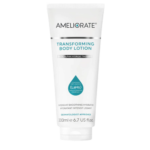 Ameliorate
Ameliorate She also recommends the Ameliorate Nourishing Body Wash and the Ameliorate Transforming Body Lotion as her best products to protect your skincare barrier. Other body washes or cleansers can strip away essential moisturising and nourishing substances, so you need to use a mild cleanser to protect your skin’s natural barrier.
Ameliorate’s Nourishing Body Wash is soap-free and ph-balanced. It also contains natural omega oils and Ameliorate’s LaH6 skin hydration complex, which helps to soften and moisturise your skin. If you use this Ameliorate body wash regularly it will enhance your skin’s natural protective layer. You can read more about Ameliorate in our Brand Spotlight.
After washing, you can then use the Ameliorate body lotion to trap that moisture and give your skin barrier a boost. It contains lactic acid which helps stimulate the exfoliation of skin cells and increases ceramides that help to repair your skin barrier function.
Another important way to help protect your skin barrier is to always use an SPF, even in winter. In summer you’ll want to use an SPF30 or greater because the sun is a major cause of a damaged skin barrier, that will make your skin look older.
If you feel your skin is looking older and has possibly had some damage already then Dermalogica’s Dynamic Skin Recovery SPF50 daily moisturiser can help repair the damage and give you better protection.
It contains antioxidant white tea, polyphenols, which have anti-inflammatory and antioxidant properties, and a polypeptide that reduces the appearance of fine lines and strengthens your skin barrier.

Kat is a freelance journalist, photographer, and the founder of Simply Gender Free – a company dedicated to smashing gender stereotypes in kids’ products. As a mum of two, Kat is passionate about making the world a better place for the next generation
